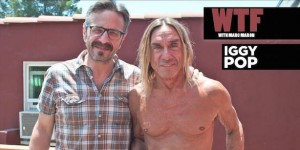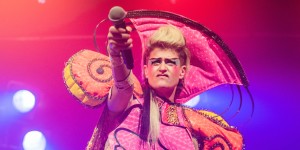The importance of Peaches
by Adria Young
September 10, 2015
The Canadian icon talks fear, Kanye, and the making of her new album 'Rub.'
Toronto born and raised artist and actor Peaches (Merrill Beth Nisker) emerged as a cultural force in the mid-1990s with her explicit form of electro-clash, a genre that blends the sounds of ‘80s pop new-wave with ‘90s techno. Her lyrics and themes have always attempted to undo the heteronormative status quo and she consistently centralizes various expressions of LGBTQ sexuality. Incredibly prolific, her songs subvert and mock the persistence of the male gaze in popular culture while politicizing social issues, like on 2006’s Impeach My Bush. Her sound production techniques continue to add to the canon of progressive dance music.
Over the last 20 years, Peaches, who has now lived in Berlin for several years, has impacted almost every cultural medium, from her provocative albums to her fashion to her John Waters-esque DIY films, like 2012 feature-length anti-musical, Peaches Does Herself. Later this month, Peaches releases her sixth self-produced album, RUB. “It was just me and (producer) Vice Cooler in my garage for 10 hours a day for a year,” she says. As a dance album, it’s incredible; as a social statement, it’s awe-inspiring. Songs like “Dick in the Air” and “Free Drink Ticket” throw up clever middle-fingers to agents of prejudice. With guests like Kim Gordon and Feist, and a video for each track, Peaches once again takes on the insidious elements of misogyny, homophobia, and social oppression that persist in pop culture.
AUX: RUB is killer. On the song “Rub,” there’s a reverse bukake scene, which is just amazing as an image. I find it super interesting that initially you were considered explicit and almost dangerous as an artist, but now 20 years later, these themes and ideas that you present are not really as controversial. They’re accepted and welcomed.
Peaches: Yeah, I find that amazing. People keep saying things to me like, ‘Oh you’re important.’ And I’m not saying I am particularly important but it’s nice to have people finally catch up with what’s going on and lose a little bit of fear, and to feel comfortable enough to approach these topics which are very important. I think that’s what they’re saying. They say I’m important but what they’re really saying is that these topics are important.
But I think your work has helped to make these topics acceptable and welcome. Like, one of your consistent messages is that people just need to be themselves. But they need to be able to see themselves in culture to say ‘Oh, that’s me!’ and I think that’s what your work does. It offers a different voice. I think this my way of saying thank you.
Aw, thank you! You have to be who you are. I think that’s my life goal. It’s everybody’s goal but you have to figure out who you are. You can’t have these restrictions from society telling you ‘this is wrong and this is wrong.’ It’s a really important journey.
Living in Berlin, do you notice differences between Germany and North America, in terms of LGBTQ rights?
It’s really different. What’s strange is that gay marriage isn’t legal in Germany. But people still get married, it doesn’t seem to be a problem or anything. But in America, it seems like everything is so hysterical. In America, it’s always huge, when something happens. But in Germany, it’s just like, this is how we do things. In America, it’s hysteria everywhere, all the time, in daily life, in terms of the restrictions to things. There are things you can’t do for no reason. There are attitudes that you can’t even believe still exist, for no reason. Germany isn’t the be-all and end-all, but because of the country’s history, they’re more careful, I think.
Like, in terms of the suppression of rights?
Yeah, and then America still thinks it’s the best and that’s unbelievable to me. It’s an insane hypocritical ‘land of the free’ but it’s more like, ‘land of the get into debt with a credit card.’ It seems like it’s free but there’s nothing free about it.
I agree and I love the Americana of “Close Up.” It has a mock Madonna’s “Vogue” feeling and features Kim Gordon, who is also in the video with female wrestlers, which is something I personally love. Can you tell me more about the video?
I thought it would be a good idea to have a trainer and student vibe kind of thing, and I was thinking about the movie Rocky and how it’s such a bro-down, so I said, let’s get Kim to be my trainer, and it wasn’t so much serious bumping, more like performance boxing. I was happy that I have enough of a wrestler’s body, too. And then the people in it — Joey Ruan, Dirty Sanchez, Cassandro — they all perform with this group in L.A. called Lucha Vavoom. It’s like Mexican wrestling meets burlesque and I’ve performed with them before, my own songs. So I’d worked with them before and I knew I’d have access to them so we went from there.
And so Kim is your trainer. Does that speak to your real-life relationship with her?
She’s just a good person to look up to. I first had the sense of that when she came in to do the track. I was thinking, like, ‘You don’t normally hear Kim on something like this, is it gonna work for her?’ But right away she was like, ‘Oh, this sounds cool,’ and she nailed the track and I was reminded that, oh yeah, she’s Kim Gordon. She’s so into improvisation and getting it down right away.
What can you tell me about the album’s production?
I worked with Vice Cooler, a good friend of mine who has been nerding out on these sounds for years. You know, sounds have gotten so much easier to make and can be exactly what you want, and they sound like outboard gear. This album was all done on a computer. My studio is a table, a laptop, and two speakers. Not even a mouse, not even a keyboard, so, we did it like that together. It’s incredible what you can do now and what sounds you can get.
Compared to 15 years ago?
Compared to six years ago! People were going, like, you can’t do that, it’s going to sound like a computer album, but no it doesn’t. We played it for some high-level outboard geek people and they were like, ‘wow.’ It was all in the same groove. It turned out big.
Big is a good word for it. It also feels very of the moment. Is that how you write?
Yeah. I just try and go from what I’m into at the time. (On “Rub”) I think the line, ‘I can’t talk right now, this chick’s dick is in my mouth’ stems from Yeezus, and how many times Kanye says chicks are sucking his dick, like over and over again, and I’m like, Oh my God. Like, stop. But then a line like, ‘Who’s jizz is this?’ (“Dick in the Air”), that’s been following me around for years. It’s exciting when a line is in my head and it just fits perfectly with a song. But then, yeah, there’s one really strong Kanye line where he says, “My fist is up her like a civil rights sign,” so I was inspired by that. It’s always, ‘what would be my take on this?’
I love that you’re always looking at the mainstream narrative and just totally subverting it.
Yeah. That’s kinda my jam.
Tags: Music, Cancon, Featured, Interviews, peaches
Featured Image via: Daria Marchik





